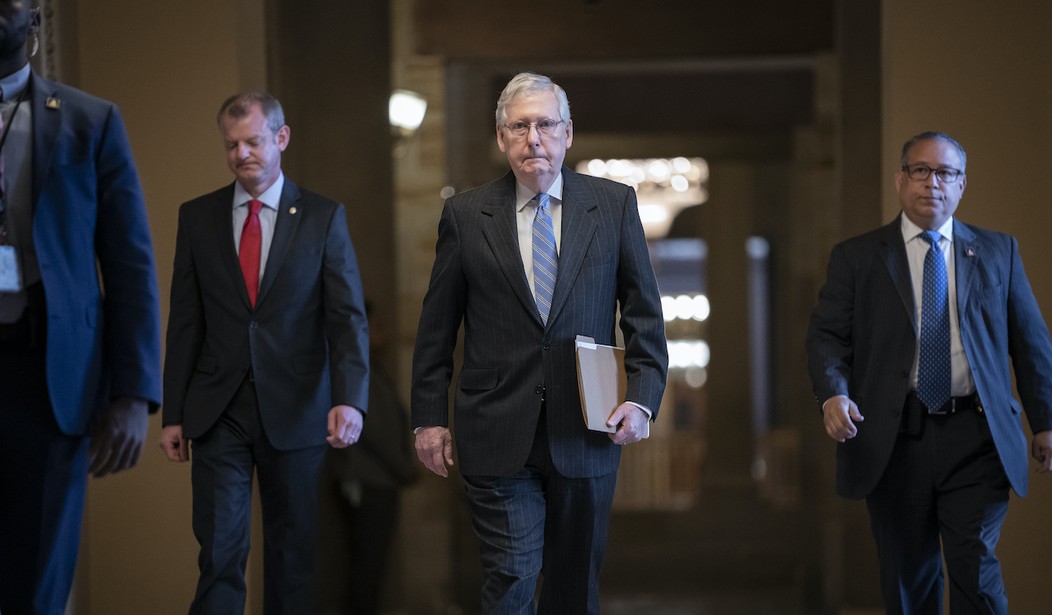Politics being politics, and politicians being politicians, Americans have figured out how, along with sore throats and violent coughing, the coronavirus causes finger-pointing, loud talking and endless credit-claiming.
The best remedy I know of: huge handfuls of salt for sprinkling on the gratitude that comes with seeing government now and then live up to its legitimate role as protector of the public.
Clearly, the finish line in this saga of the virus that ate the world is far distant. There's ample time to note the holes in the view that all humans must do to be happy is turn over every problem to government. It's the view now best associated with the presidential candidacy of Sen. Bernie Sanders -- of whom, mercifully, very little is heard these days.
The argument for government intervention in human crises has to do with government's power and command of resources. Case in point: the $2 trillion economic package signed into law last weekend by the president. How well the package will address the economic mess caused by the lockdown of so many businesses, and the expulsion of so many workers from their livelihoods, is something we'll doubtless debate forever.
Was there a choice about passing the bill? Senate Majority Leader Mitch McConnell called on Republicans to gag and vote for it. They did. It passed unanimously. It's so large and complex a thing probably nobody in Congress or the country expects all its hyperexpensive moving parts to work smoothly. Working right wasn't the point -- at least not the whole point. The point was boosting public morale: showing that this country's government was going to stand by this country's people. Already, Nancy Pelosi is forecasting introduction and passage of a follow-up bill.
Recommended
The tentativeness of any rejoicings being planned in the capital ought -- but won't -- reacquaint our political leaders with the lost virtue of modesty -- which, duly exercised, should muffle the political attacks breaking out everywhere.
It's a presidential year! From the Democrats' perspective, doesn't it make sense to hammer the president for what one CNN analyst, Gloria Borger, calls the "empathy gap" in his manner, so full of "personal preening and half-baked, often corrected declarations." Gee, lady, that's got a lot to do with whether and how fast we're going to pull out of this slough, in some measure with the help of the preener in chief.
Ah, though, that's politics: a game at which Borger's presidential target shows some skill when it comes to advance and retreat. First, an unsupported interest in an Easter deadline for starting to reopen businesses and then a withdrawal from that exposed position by means of an extension of federally overseen nesting policies into May. Trump found he had spoken in untimely fashion. It wasn't the first time mind and mouth were in disconnect mode. Can we kind of put it in perspective?
It's time to acknowledge, though I doubt we will, that all this political back-and-forthing gets nobody anywhere in a crisis; that the politicians of both parties don't know any more about the coronavirus than anyone else; that, in making grand statements about public policy and passing grand pieces of legislation, they're engaging in showy guesswork, for which they hope to be handsomely rewarded.
This should be said: Self-interest is a human attribute, present in the whole of life. Despite it, the flame of public spirit burns on -- doubtless in a lot of unlikely hearts. I think, all the same, someone needs to turn up the gas beneath it.
Politicians we have to have. Of some we end up proud, in that they've done service at some cost to themselves. For all that, a country's people are its real strength. Their minds, their courage, their daring -- or lack thereof -- build or disable great nations. The people they put in charge of their public affairs are mere reflections of those who voted for them.
Who's going to reopen the restaurants closed by a vicious virus? Who's going to fill the sports stadiums? Write books and songs about what's been going on? Who's going to recreate America when the political back-biting dies away for a bit -- long enough to remind us who the real creators are?
William Murchison is writing a book on moral reconstruction in the 21st century. His latest book is "The Cost of Liberty: The Life of John Dickinson."
























Join the conversation as a VIP Member